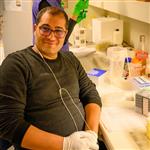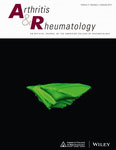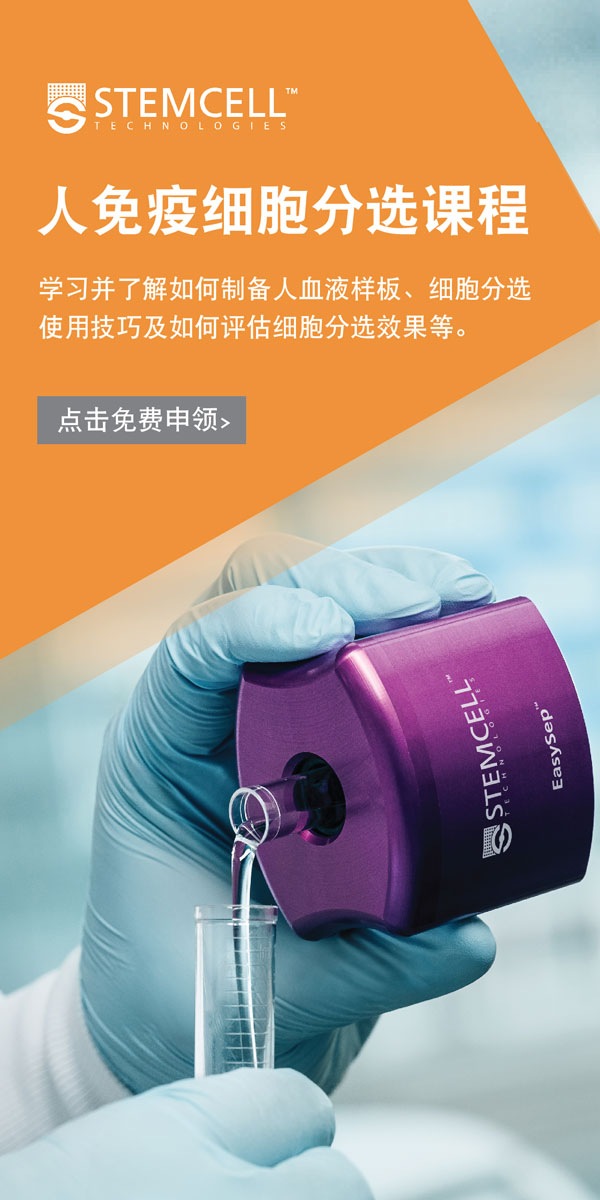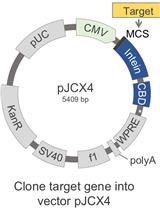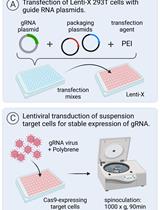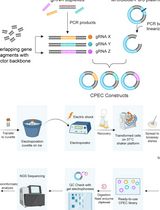- EN - English
- CN - 中文
A Refined Protocol for Identifying Citrulline-specific Monoclonal Antibodies from Single Human B Cells from Rheumatoid Arthritis Patient Material
类风湿性关节炎患者单个B细胞中瓜氨酸特异单克隆抗体的改进鉴定方案
发布: 2019年09月05日第9卷第17期 DOI: 10.21769/BioProtoc.3347 浏览次数: 6989
评审: Gal HaimovichAruna BitraRajesh Thippeshappa
Abstract
We describe here a detailed, refined protocol for the generation of citrulline-specific monoclonal antibodies from single human B cells from rheumatoid arthritis (RA) patients. This protocol provides a detailed guide of the procedure starting from single B cells of your choice and followed by amplification of the variable region of immunoglobulin genes by RT-PCR, subsequent immunoglobulin gene cloning, recombinant IgG1 monoclonal antibody (mAb) production and quality controls. The produced mAbs can be used for further studies including reactivity towards candidate antigens and functionality both in vitro and in vivo. This protocol can be used to generate antigen-specific mAbs from B cells derived from different tissues and compartments, including peripheral blood, synovial fluid, digested biopsies, bone marrow aspirations, and bronchoalveolar lavage fluid. Notably, although examples are given on how to identify citrulline-specific autoantibodies the general methods can also be applied to other reactivities.
Keywords: Autoantibodies (自身抗体)Background
Rheumatoid arthritis (RA) is an autoimmune disease affecting 0.5% to 1% of adults worldwide and can if left untreated lead to joint destruction and disability (Neovius et al., 2011). Anti-citrullinated protein autoantibodies (ACPA) are a hallmark of RA and can predict a more aggressive disease course in patients that belong to the positive subgroup. This autoreactivity is directed towards citrullination, an enzyme mediated post-translational modification changing the positively charged arginine to a neutral citrulline. Interestingly, serum ACPA IgG often precede the onset of disease (Rantapää-Dahlqvist et al., 2003; Nielen et al., 2004) and while recent discoveries have started to decipher their roles in the pathogenesis and suggested that APCA may directly mediate pathogenic effects such as pain, osteoclast differentiation, and monocyte pro-inflammatory response (Harre et al., 2012; Sokolove et al., 2014; Wigerblad et al., 2016; Krishnamurthy et al., 2016; Krishnamurthy et al., 2019), much remains to be elucidated. The generation of citrulline-specific monoclonal antibodies (mAbs) from single B cells obtained from RA patient material provides a valuable tool to better understand ACPA-mediated functionality, as well as the B-cell biology and the Immunoglobulin (Ig) gene repertoire during disease. However, when generating monoclonal antibodies from autoimmune patients, there are several technical challenges and important aspects to consider, especially regarding analysis of the citrulline fine-specificity of these produced mAbs.
Hence, here we describe a detailed, refined protocol for the generation of citrulline-specific mAbs from single B cells from RA patients. The protocol provides a detailed guide of the procedure starting from single-cell sorted B cells e.g., by flow cytometry, amplification of the variable region of immunoglobulin genes by RT-PCR, and subsequent immunoglobulin gene cloning and full recombinant IgG1 monoclonal antibody (mAb) production. This protocol is derived from strategies developed some years ago in the Nussenzweig’s laboratory and that has been widely applied for generation of human monoclonal antibodies (Wardemann et al., 2003; Tiller et al., 2008). However, this protocol also includes more detailed methods for quality controls, IgG production, purification, storage and specificity-screenings. These are things that we have found to be critical to avoid false positivity in assays and to be able to separate true strong antigen-specific reactivity from the polyreactivity commonly seen in autoimmune patients that can lead to incorrect conclusions (Amara et al., 2019). Since aggregation or poor-quality IgG can give false positivity in ELISA, we strongly recommend to avoid IgG preparations with low concentrations and that any positivity found in initial exploratory screenings is confirmed in larger scale IgG expression batches that are more rigorously quality control tested. Furthermore, although this collection of methods is providing in-house ELISA protocols for detection of citrulline reactivity we recommend using several methods in parallel for confirmation of reactivity (e.g., antigen-arrays, multiplex bead arrays, and/or commercial CCP2/CCP3 clinical ELISA kits). All screenings should use an IgG concentration of 5 μg/ml IgG or lower to avoid any false positivity and any identified positive clones should subsequently be titrated from 5 μg/ml to 50 ng/ml (or lower) to confirm binding. While the frequency of polyreactive B cells clones are relatively high in the B cell repertoire, especially in memory B cells carrying low SHM, our data suggest that the true antigen-specific clones are in contrast relatively rare also in the tissue.
Therefore, it may be favorable to use an enrichment strategy for antigen-specific B cells or defined B cells subsets (e.g., antigen-tetramer sorting) rather than a broad repertoire screening. However, these methods are not within the scope of this protocol. Notably, a majority of the high-binding ACPA clones identified so far (Lloyd et al., 2018; Titcombe et al., 2018; Steen et al., 2019) carry high level of somatic hypermutations and N-linked glycosylation sites in the variable regions and these features may also have an indicative value when identifying new positive mAbs.
With this method, it is possible for an experienced researcher to produce milligrams of human recombinant mAbs within a few weeks, providing a valuable tool for downstream functional studies both in vitro and in vivo. The capacity to produce and characterize antigen-specific mAbs is extremely useful for elucidating the interactions of particular antibodies and antigens and exploring B-cell immunology.
Materials and Reagents
Common list
- Common list1.Adhesive PCR plate foils
- Adhesive PCR plate seals
- Filtered pipette tips
- Graduated sterile pipettes
- Parafilm
- Reagent reservoir, 100 ml sterile polystyrene
- 1.5 and 2 ml microtubes
- 15 ml conical tubes
- 50 ml conical tubes
- 96-well PCR plates
- 96-well PCR plates, skirted
- Bacto-Tryptone (Thermo Fisher Scientific, catalog number: 16299741)
- CaCl2 (Sigma-Aldrich, catalog number: C1016)
- DNase Away surface Decontaminant (Thermo Fisher Scientific, catalog number: 7010PK)
- Dulbecco’s Phosphate Buffered Saline (DPBS) (Sigma-Aldrich, catalog number: D8662)
- Ethanol 99.5% Analytical Grade (Thermo Fisher Scientific, catalog number: 12634800)
- GelRed Nucleic Acid gel stain (Biotium, catalog number: 41003)
- Glycine (Sigma-Aldrich, catalog number: 50046)
- High-quality deoxynucleotide triphosphates (dNTPs) (Promega, catalog number: U1335)
- Isopropanol PA (VWR, catalog number: 83442)
- Milli-Q water
- NaCl (Sigma-Aldrich, catalog number: S9888)
- NaCO3 (Merck millipore, catalog number: 1063920500)
- NaHCO3 (Merck millipore, catalog number: 1063290500)
- Nuclease-free water (Qiagen, catalog number: 129114)
- NucleoSpin 96-PCR cleanup kit (Macherey-Nagel, catalog number: 7406584)
- RNase away surface Decontaminant (Thermo Fisher Scientific, catalog number: 7000TS1)
- SDS (Sigma-Aldrich, catalog number: L3771)
- Triton X-100 (Sigma-Aldrich, catalog number: 93442)
- Trizma base (Sigma-Aldrich, catalog number: T6066)
- Trizma hydrochloride (Sigma-Aldrich, catalog number: T3253)
- Tween 20 (Sigma-Aldrich, catalog number: P9416)
- UltraPure Agarose (Thermo Fisher Scientific, catalog number: 16500500)
- Yeast extract (Thermo Fisher Scientific, catalog number: 15815488)
- 100 bp DNA ladder (Thermo Fisher Scientific, catalog number: 15628019)
- 100 ml sterile polystyrene basin
- 10x TBE (powder) (Thermo Fisher Scientific, catalog number: AM9864)
- 98% Sulphuric acid (VWR, catalog number: 1.00748.2500)
- B-cell receptor single-cell cloning
Collection of single-cell sorted cells- 40 μm cell strainer (Corning, catalog number: 431750)
- DTT (Thermo Fisher Scientific, catalog number: Y00147)
- Gibco PBS (10x), pH 7.2 (Fisher Scientific, catalog number: 11514526)
- RNAsin ribonuclease inhibitors (Promega, catalog number: N2511)
- Sorted patient B cells
- 70% Ethanol (in nuclease-free water)
- Nonidet NP40 or TERGITOL Solution (Sigma-Aldrich, catalog number: NP40S)
- Random hexamer primer (RHP) mix (Sigma-Aldrich, catalog number: 11034731001)
- RNAsin ribonuclease Inhibitors (Promega, catalog number: N2511)
- Superscript III reverse transcriptase kit (Thermo Fisher Scientific, catalog number: 18080085)
- 70% Ethanol (in nuclease-free water)
Immunoglobulin variable region gene amplification- HotStartTaq plus DNA polymerase Kit (Qiagen, catalog number: 203609)
- Sequencing and PCR primers (see Appendix)
- 70% Ethanol (in nuclease-free water)
- Gene-specific primers (see Appendix)
- HotStartTaq plus DNA polymerase Kit (Qiagen, catalog number: 203609)
- 70% Ethanol (in nuclease-free water)
- AgeI-HF (NEB, catalog number: R3552L)
- BsiWI-HF (NEB, catalog number: R3553S)
- SalI-HF (NEB, catalog number: R3138S)
- XhoI-HF (NEB, catalog number: R0146S)
- 70% Ethanol (in Milli-Q water)
- Human IgH linearized plasmid vector with cloning sites for AgeI and SalI (Gift from Hedda Wardemann and Eric Meffre)
- Human Igκ linearized plasmid vector with cloning sites for AgeI and BsiWI (Gift from Hedda Wardemann and Eric Meffre)
- Human Igλ linearized plasmid vector with cloning sites for AgeI and XhoI (Gift from Hedda Wardemann and Eric Meffre)
- QIAquick gel extraction kit (Qiagen, catalog number: 28704)
- Quick ligase Kit (NEB, catalog number: M2200L)
- 70% Ethanol (in Milli-Q water)
- Plastic Petri dishes (100 mm x 15 mm) (Fisher Scientific, catalog number: S33580A)
- Ampicillin (Sigma-Aldrich, catalog number: A5354)
- Bacteriological agar (Sigma-Aldrich, catalog number: A5306)
- Disposable bacteria cell spreaders and inoculating loops
- Glycerol (Sigma-Aldrich, catalog number: G5516)
- Subcloning efficiency DH5α competent cells (Thermo Fisher Scientific, catalog number: 18265017)
- 70% Ethanol (in Milli-Q water)
- Agar plates
- GoTaq G2 DNA polymerase (Promega, catalog number: M7848)
- Insert check PCR primers (available in Appendix)
- Sequencing primers (available in Appendix)
- 70% Ethanol (in Milli-Q water)
- Ampicillin (Sigma-Aldrich, catalog number: A5354)
- LB broth (Sigma-Aldrich, catalog number: L3552)
- QIAprep spin miniprep Kit (Qiagen, catalog number: 27106)
- 70% Ethanol (in Milli-Q water)
- Exploratory screening of monoclonal antibodies (mAbs)
Small scale production of mAbs (30 ml cultures)- Corning erlenmeyer culture flasks (125 ml) (Sigma-Aldrich, catalog number: CLS431143)
- 0.22 μm vacuum filter units (Corning, catalog number: 431096)
- 0.22 μm syringe filters
- Expi293 cells (Thermo Fisher Scientific, catalog number: A14528)
- Expi293 expression medium (Thermo Fisher Scientific, catalog number: A1435101)
- OptiPRO serum free medium (sfm) (Thermo Fisher Scientific, catalog number: 12309019)
- PEI-MAX 40K transfection grade linear polyethylenimine hydrochloride (Polysciences, catalog number: 24765-1)
- Erythrosin B (Sigma-Aldrich, catalog number: 198269)
- 70% Ethanol (in Milli-Q water)
- Bio-spin disposable chromatography columns (Bio-Rad, catalog number: 732-6008)
- Amicon Ultra 4 ml 50 kDa MWCO centrifugation units (Millipore, catalog number: UFC805008)
- Zeba Spin Desalting Columns 7K MWCO 5 ml (Thermo Fisher Scientific, catalog number: 89892)
- 0.22 μm low protein binding syringe filters (Millipore Millex-GV, catalog number:SLGV013SL)
- Protein G sepharose 4 fast flow antibody purification resin (GE Lifesciences, catalog number: 17061805)
- 70% Ethanol (in Milli-Q water)
- 0.1 M glycine (pH 3.0) (see Recipes)
- 1 M Tris (pH 8.0) (see Recipes)
- Corning® 96-well half area clear flat bottom polystyrene high bind microplate (Corning, catalog number: 3690)
- 3,3′,5,5′-Tetramethylbenzidine (TMB) substrate (Sigma-Aldrich, catalog number: T0440)
- 70% Ethanol (in Milli-Q water)
- Bovine serum albumin (BSA) (Sigma-Aldrich, catalog number: A7906)
- Goat F(ab’)2 anti-human IgG Fab (Jackson Immunoresearch, catalog number: 109-006-097)
- HRP conjugated goat F(ab’)2 anti-human IgG Fc gamma specific (Jackson Immunoresearch, catalog number: 109-036-008)
- Human IgG whole molecule (Jackson Immunoresearch, catalog number: 009-000-003)
- 0.5 M H2SO4 (see Recipes)
- Bolt 4-12% Bis-Tris Plus protein gels (Thermo Fisher Scientific, catalog number: NW04122BOX)
- Bolt lithium dodecyl sulfate (LDS) sample Buffer (4x) (Thermo Fisher Scientific, catalog number: B007)
- Bolt methyl ester sulfonate (MES)-sodium dodecyl sulfate (SDS) running buffer (Thermo Fisher Scientific, catalog number: B000202)
- Bolt sample reducing agent (10x) (Thermo Fisher Scientific, catalog number: B009)
- SeeBlue Plus2 pre-stained protein standard (Thermo Fisher Scientific, catalog number: LC5925)
- SimplyBlue SafeStain (Thermo Fisher Scientific, catalog number: LC6065)
Polyreactivity ELISA- Bovine serum albumin (BSA) (Sigma-Aldrich, catalog number: A7906)
- Deoxyribonucleic acid sodium salt, from salmon testes (Sigma-Aldrich, catalog number: D1626)
- HRP conjugated F(ab)2 anti-human IgG Fc gamma specific (Jackson Immunoresearch, catalog number: 109-036-008)
- Insulin solution human (Sigma-Aldrich, catalog number: 19278-5ML)
- Lipopolydsaccharides from Escherichia coli 055:B5 (Sigma-Aldrich, catalog number: L6525-1MG)
- Nunc-ImmunoTM MicroWellTM 96-Well plates, high binding (Nunc, catalog number: 442404)
- TMB substrate (Sigma-Aldrich, catalog number: T0440)
- 0.5 M H2SO4 (see Recipes)
Anti-Bovine serum albumin (BSA)/plastic and rabbit IgG ELISA- Bovine serum albumin (BSA) (Sigma-Aldrich, catalog number: A7906)
- Chromopure rabbit IgG (Jackson Immunoresearch, catalog number: 011-000-003)
- HRP conjugated rabbit F(ab’)2 anti-human IgG Fc gamma specific (Jackson Immunoresearch, catalog number: 309-036-008)
- Malondialdehyde (MDA) modified BSA (Academy Bio-Medical, catalog number: 20P-MD-BS102)
- Molecular biology grade BSA (NEB, catalog number: B9000S)
- TMB substrate (Biolegend, catalog number: 421101)
- 0.5 M H2SO4 (see Recipes)
Anti-alpha enolase 1 and histone 4 ELISA- Corning® 96-well half area clear flat bottom polystyrene high bind microplate (Corning, catalog number: 3690)
- Bovine serum albumin (BSA) (Sigma-Aldrich, catalog number: A7906)
- Carbonate buffer (see Recipes)
- HRP conjugated goat F(ab’)2 anti-human IgG Fc gamma specific (Jackson Immunoresearch, catalog number: 109-036-008)
- Peptides (Table 7)
- Reference (pool of ACPA + RA serum samples)
- RIA buffer (see Recipes)
- TMB substrate (Sigma-Aldrich, catalog number: T0440)
- 0.5 M H2SO4 (see Recipes)
- Pierce Streptavidin Coated High Capacity Plates (Thermo Fisher Scientific, catalog number: 15500)
- Biotinylated peptides (Table 7)
- Bovine serum albumin (BSA) (Sigma-Aldrich, catalog number: A2153)
- HRP conjugated F(ab)2 anti-human IgG Fc gamma specific (Jackson Immunoresearch, catalog number: 109-036-008)
- Reference (pool of ACPA + RA serum samples)
- TMB substrate (Sigma-Aldrich, catalog number: T0440)
- RIA buffer (see Recipes)
- TBE buffer (see Recipes)
- 0.5 M H2SO4 (see Recipes)
- IMMUNOSCAN CCPlus clinical assay (Euro Diagnostica, catalog number: RA-96PLUS)
- Large scale expression of monoclonal antibodies for in-depth functionality assays
Plasmid Maxipreps- LB agar plates
- 225 ml conical centrifuge tubes with graduations (VWR, catalog number: 89218-286)
- Ampicillin (Sigma-Aldrich, catalog number: A5354)
- PureLinkTM HiPure Plasmid DNA Maxiprep Kit (Thermo Fisher Scientific, catalog number: K210017)
- 70% Ethanol (in Milli-Q water)
- LB medium (see Recipes)
- Corning Erlenmeyer culture flasks (1 L) (Sigma-Aldrich, catalog number: CLS431147)
- 225 ml conical centrifuge tubes with graduations (VWR, catalog number: 89218-286)
- 0.22 μm syringe filter
- Expi293 cells (Thermo Fisher Scientific, catalog number: A14528)
- Expi293 Expression Medium (Thermo Fisher Scientific, catalog number: A1435101)
- OptiPRO serum free medium (sfm) (Thermo Fisher Scientific, catalog number: 12309019)
- PEI-MAX 40K Transfection Grade Linear Polyethylenimine Hydrochloride (Polysciences, catalog number: 24765-1)
- Erythrosin B (Sigma-Aldrich, catalog number: 198269)
- 70% Ethanol (in Milli-Q water)
Refer to “IgG concentration assessment from purified mAbs” in Materials and Reagents B
Purification of mAbs from large scale expressions- Slide-A-Lyzer G2 Dialysis cassettes, 10K MWCO 30-70 ml (Thermo Fisher Scientific, catalog number: 88254)
- Zeba Spin Desalting Columns 7K MWCO 5 ml (Thermo Fisher Scientific, catalog number: 89892)
- Column PD-10, Empty (GE Healthcare, catalog number: 17-0435-01)
- LabMate PD-10 Buffer Reservoir (GE Healthcare, catalog number: 18-3216-03)
- 0.22 μm low protein binding syringe filters (Millipore Millex-GV, catalog number: SLGV013SL)
- Protein G Sepharose 4 Fast Flow antibody purification resin (GE Lifesciences, catalog number: 17061805)
- 0.1 M glycine (pH 3.0) (see Recipes)
- 1 M Tris (pH 8.0) (see Recipes)
Refer to “IgG concentration assessment from purified mAbs” in Materials and Reagents B
SDS-PAGE
Refer to “SDS-polyacrylamide gel electrophoresis” in Materials and Reagents B
Test for IgG aggregation- 0.22 μm bottle-top vacuum filters (Corning, catalog number: 431096)
- 20% ethanol (in Milli-Q water)
- 70% Ethanol (in Milli-Q water)
No specific Materials and Reagents for this section of the protocol.
Citrulline-Specificity ELISAs with titration curves
Refer to “Monoclonal antibody screening for citrulline specificities” in Materials and Reagents B
CCP2 ELISA
Refer to “anti-Cyclic Citrullinated Peptides 2nd generation (CCP2) ELISA” in Materials and Reagents B - LB agar plates
Equipment
Common list
- Centrifuge suitable for 1.5 and 2 ml microtubes (Sigma Laborzentrifugen GmbH, catalog number: 10020)
- Centrifuge suitable for 225 ml tubes, 50 ml tubes, and 96-well PCR plates (Sigma Laborzentrifugen GmbH, catalog number: 10475)
- ELISA plate reader (Molecular Devices, catalog number: PLUS 384)
- ELISA plate washer (Tecan, catalog number: 16029011)
- Heating block suitable for 1.5 and 2 ml microtubes
- Microwave (Whirlpool)
- Pipette controller (Thermo Fisher Scientific, catalog number: 10759754)
- Precision scale (Sartorius, catalog number: AY511)
- Protein gel electrophoresis tank (Bio-Rad laboratories, catalog number: 1656001)
- Vacuum Manifold (Promega, catalog number: A2291)
- Vacuum Manifold (Qiagen, catalog number: 19413)
- Vacuum pump (Promega, catalog number: A6722)
- Vortex (Thermo Fisher Scientific, catalog number: 15547335)
- B-cell receptor single-cell cloning
- Agarose electrophoresis gel tank (Thermo Fisher Scientific, catalog number: D3-14)
- Electrophoresis power supply (VWR, catalog number: 700-0448)
- Gel-doc Electrophoresis Apparatus (Bio-Rad laboratories, catalog number: 1708195)
- Hot plate suitable for 96-well PCR plates (Bioer Technology, catalog number: CHB-202)
- Multi-tubes vortex (VWR, catalog number: 58816-116)
- PCR cooler suitable for 96-well PCR plates (Thermo Fisher Scientific, catalog number: 10192281)
- PCR thermal cycler suitable for 96-well PCR plates (Applied Biosystems, catalog number: 435965)
- Sequencing service (e.g., internal or external provider)
- 37 °C incubator (Heraeus, catalog number: 26066010)
- 37 °C shaking incubator (Infors HT, catalog number: S-000123637)
- Exploratory screening of monoclonal antibodies (mAbs)
- Bürker counting chamber (Thermo Fisher Scientific, catalog number: 10628431)
- CO2 shaking incubator (Infors HT, catalog number: S-000117022)
- Light microscope (Zeiss, catalog number: 451487)
- Orbital tube rotator (Abdos life sciences, catalog number: E11280)
- Large scale expression of monoclonal antibodies for in-depth functionality assays
- Äkta Explorer 10 instrument (or equivalent; GE Healthcare Life Sciences)
- Enrich SEC 650 column 10 x 300 mm, 24 ml (Bio-Rad, catalog number: 7801650)
- Tube Roller mixer (Sigma-Aldrich, catalog number: Z675148)
Software
- International ImmunoGeneTics information system (IMGT/V-QUEST), a free sequence alignment software for the immunoglobulin (IG) and T cell receptor (TR) nucleotide sequences of the variable regions and domains. This integrated alignment tool compares the germline and rearranged input sequences with the IMGT reference sequences (IMGT/V-QUEST reference directory).
- UNICORN software version 5.2 (GE Healthcare Life Science).
Procedure
文章信息
版权信息
© 2019 The Authors; exclusive licensee Bio-protocol LLC.
如何引用
Amara, K., Israelsson, L., Stålesen, R., Sahlström, P., Steen, J., Malmström, V. and Grönwall, C. (2019). A Refined Protocol for Identifying Citrulline-specific Monoclonal Antibodies from Single Human B Cells from Rheumatoid Arthritis Patient Material. Bio-protocol 9(17): e3347. DOI: 10.21769/BioProtoc.3347.
分类
免疫学 > 抗体分析 > 抗体功能
分子生物学 > 蛋白质 > 分离
分子生物学 > DNA > DNA 克隆
您对这篇实验方法有问题吗?
在此处发布您的问题,我们将邀请本文作者来回答。同时,我们会将您的问题发布到Bio-protocol Exchange,以便寻求社区成员的帮助。
Share
Bluesky
X
Copy link


